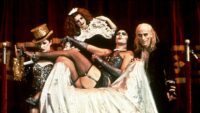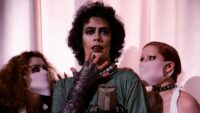On April 21, 2016, Prince died. I found out at work, a simple scroll and stop on my Facebook feed. It was just months after the passing of David Bowie, and it hit me harder than Bowie. While others had grown up with Bowie as Ziggy Stardust, I grew up with Prince and the Revolution, with music videos like “When Doves Cry” “Raspberry Beret” and “Little Red Corvette” lodged permanently in my brain. Numerous tributes poured out in the hours that followed, but the one that absolutely did me in and left me sobbing was D’Angelo featuring Princess. They picked “Sometimes It Snows in April,” a deep cut from “Parade,” the soundtrack album to Under the Cherry Moon.
https://www.facebook.com/FallonTonight/videos/10154175011513896/?v=10154175011513896
Everyone knows about Purple Rain. Some fans might even know about its much-maligned (yet still funky) sequel, Graffiti Bridge. But in between those two films is Under the Cherry Moon. It’s an outlier for a few reasons. While the films that follow the Kid are firmly lodged in the 1980s and early 1990s, Under the Cherry Moon feels like it’s set in the past, but only vaguely, much like how Baz Lurhmann’s Moulin Rouge is set in 1890s but everyone is singing songs by Madonna and the Police.
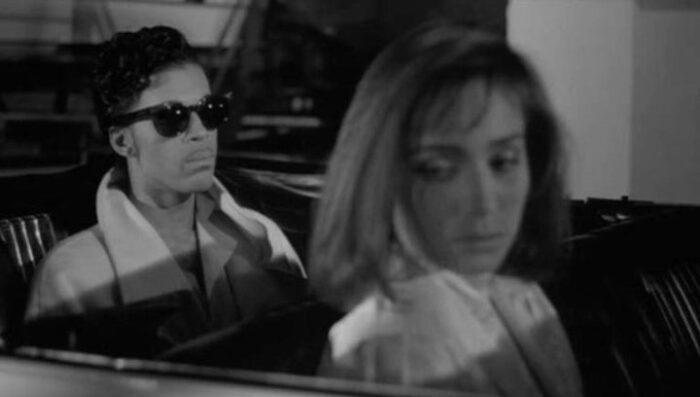
The plot is relatively straightforward (spoiler warning): Christopher Tracy (Prince) and Tricky (Jerome Benton) are living the high life in Nice, France, thanks to their womanizing ways. When the paper announces that heiress Mary Sharon (Kristin Scott Thomas) is turning 21 and coming into major money, the two scheme to woo her and make off with the cash. Things get sticky when they both fall for her and then Tricky tells Mary the truth: Christopher only wants her for her money. Christopher then must prove his love for Mary.
Meanwhile, Mary’s overprotective father Issac (Steven Berkoff) has it out for Christopher and right when the lovers are about to escape after reconciling, Christopher is shot down by Issac’s men. Tricky and Mary remain friends and become business partners over an apartment complex in Miami, and Christopher, I mean, Prince and the Revolution get down in sepia-toned heaven to the banging track “Mountains.”
No, really. That’s it.
Well, then what makes this film worth watching? There’s a lot—but it’s messy. In general, I don’t think any of Prince’s films are flawless. Both he and Madonna have this aura that translates well in music video clips but not over the course of full-length films (Evita notwithstanding, in Madonna’s case). It’s hard to understand where the disconnect is, especially since Prince was at the helm of Cherry Moon, directing the film after he fired Mary Lambert (best known for directing some of Madonna’s most iconic music videos).
Regardless, the anachronistic tone pulled me in at first glance, with the opening shots of Prince at the piano feeling like a nod to the nightclub in Casablanca, while the music ranges from avant-garde jazz and funk. Even though the film was shot in luscious color, Prince put his high heeled boot down and got this joint released in black and white, which adds to timeless, classic feel I think he wanted to achieve.
The costumes reflect this too, with men cutting fine figures in suits and women wearing dresses straight out of the 1920s, 1930s, and 1940s (although 1980s shoulder pads and big hair make some cameos). When Mary decides to run off with Christopher and Tricky for dinner, she shows up in a flapper dress and headdress that’s drop-dead gorgeous and beaded to the gods. Christopher is dressed, well, like Prince, with long white trench coats and tuxes rounding out his tight wardrobe.
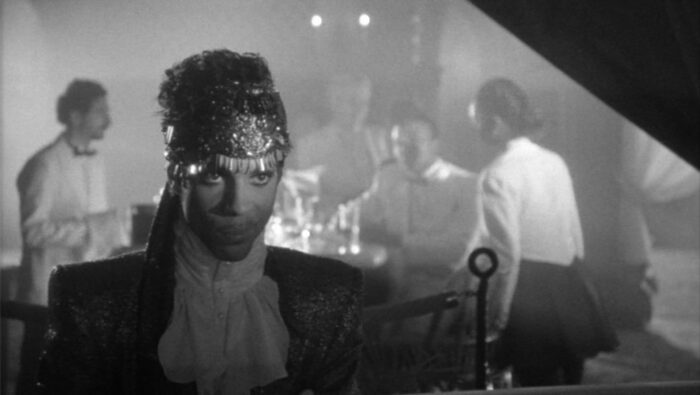
There’s a white enamel pin I bought on Etsy a while back. I wear it on my denim jacket and use it as a sort of litmus test for other film junkies (and Prince fans). While most everyone knows the symbol Prince used when he decided he didn’t want to be called Prince anymore, the phrase WRECKA STOW kind of sums up all the things Prince is in this film: irreverent, and not afraid to take a piss at himself or his co-stars. If you’re unfamiliar with WRECKA STOW, please observe.
While the overarching themes of love, sex, and God reign supreme on Cherry Moon’s soundtrack and in the notes that Christopher scatters through the film, slapstick comedy and camp elements dominate the dialogue and performances. (These were elements Jerome Benton played up a lot as Morris Day’s wingman in Purple Rain.) If you’ve never seen the film, you’ve most likely seen multiple gifs of Prince’s face dominating the comment fields across social media. He can go from screwball to Rodolfo Valentino in a matter of moments.
Prince and Kristin Scott Thomas both have the hate-love chemistry down pat, and when their characters end up hidden away in a cave, I had a good laugh because nothing good ever happens when Kristin Scott Thomas ends up in a cave. Also, Mary’s entrance in the film is spoiled rich girl realness: She shows up to her birthday party nude, then wraps herself in a sheet and plays the drums before changing into a purple velvet dress and telling Christopher and Tricky to scram. (Get it, girl.)
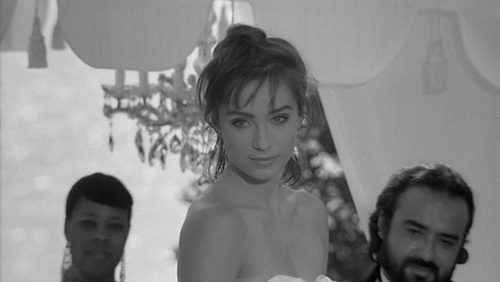
So, is Cherry Moon a good film? Is it just a hyper-stylised visual backdrop for the “Parade” album? Is it the world’s longest perfume ad (if Prince’s thirst for women and art itself can be bottled and considered perfume)?
As the meme goes, yes. It’s a mess, but I love it. For better or worse, I also think it’s aged better than Prince’s other films because it feels timeless, current, and wildly otherworldly. There’s also something to be said for an artist going all-in on something, and you know from beginning to end, this was all Prince’s idea.
Cherry Moon was made at the height of Prince’s crossover popularity, and instead of doing the easy thing (a Purple Rain sequel), he decided to do whatever the hell he wanted, with the Revolution in tow. In this case, it meant making an art school 1940s screwball rom-com with a moral message thrown in the final act. The film bombed, but the “Parade” album sold well, thanks to the infectious single “Kiss.” But that album closes with “Sometimes in Snows April” and every time I hear it now, I think of that day Prince died, his beautiful and rare talent (and sass) silenced forever.
Sometimes it snows in April
Sometimes I feel so bad, so bad
Sometimes I wish that life was never ending
But all good things, they say, never last
All good things they say, never last
And love, it isn’t love until it’s past

